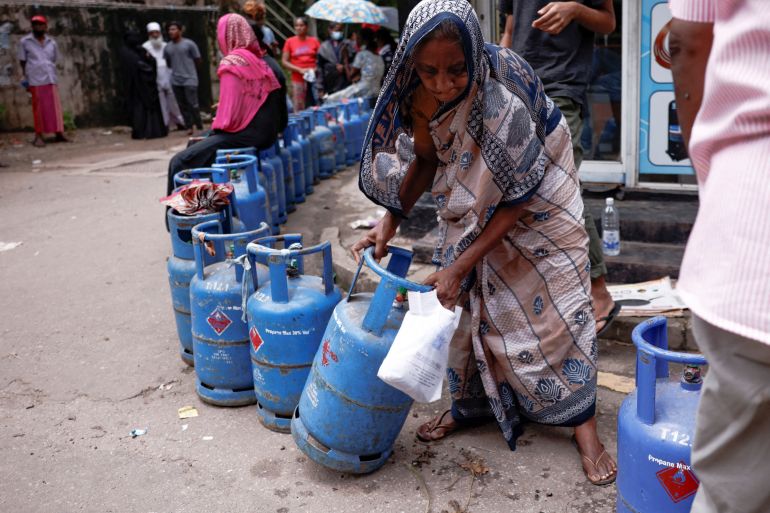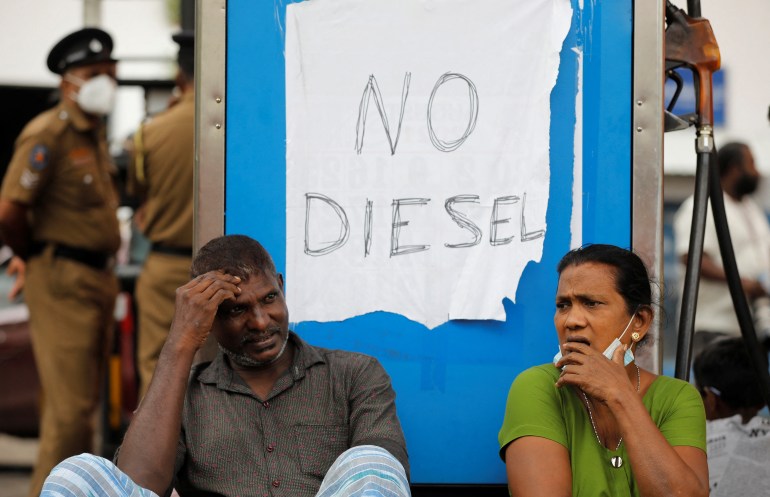Sri Lanka PM urges ‘patience’ as UN set to make appeal for funds
The UN will make worldwide public appeal for funds and has pledged $48m for food, agriculture and health, says Ranil Wickremesinghe.

Sri Lanka’s prime minister says the United Nations has arranged a worldwide public appeal to help the island nation’s food, agriculture and heath sectors face serious shortages amid its worst economic crises in recent memory.
In his speech to parliament on Tuesday, Prime Minister Ranil Wickremesinghe said the UN plans to provide $48m in assistance over a four-month period. But the projected funds barely scratch the surface of the $6bn the island nation needs to stay afloat over the next six months.
Keep reading
list of 4 itemsSri Lanka’s economic crisis threatens its dollar-earning IT firms
Photos: Sri Lanka female rickshaw driver’s long wait for fuel
Sri Lanka’s ‘picturesque’ protests
Wickremesinghe said that for the next three weeks, it will be tough to obtain some essentials and urged people to be “united and patient”, to use the scarce supplies as carefully as possible and to avoid nonessential travel.
“Therefore, I urge all citizens to refrain from thinking about hoarding fuel and gas during this period. After those difficult three weeks, we will try to provide fuel and food without further disruptions. Negotiations are under way with various parties to ensure this happens,” Wickremesinghe said.
The Indian Ocean nation of 22 million is nearly bankrupt and has suspended repayment of its foreign loans. Its foreign reserves are almost spent, which has limited imports and caused serious shortages of essentials including food, medicine, fuel and cooking gas.

This year, the island is due to repay $7bn of the $25bn in foreign loans it is scheduled to pay by 2026. Sri Lanka’s total foreign debt is $51bn.
To tide over the current turmoil, Sri Lanka will need about $3.3bn for fuel imports, $900m for food, $250m for cooking gas and $600m more for fertiliser this year, Wickremesinghe told parliament.
The central bank has estimated the economy will contract by 3.5 percent in 2022, Wickremesinghe said, but added that he was confident growth could return with a strong reform package, debt restructuring and international support.
“Only establishing economic stability is not enough, we have to restructure the entire economy,” said Wickremesinghe, who is working on an interim budget to balance battered public finances.
“We need to achieve economic stability by the end of 2023.”
IMF bailout talks
Sri Lanka is negotiating a loan package worth about $3bn from the International Monetary Fund (IMF), in addition to help from countries such as China, India and Japan.
Wickremesinghe on Tuesday asked the IMF to lead a conference to unite Sri Lanka’s lending partners.
“Holding such a conference under the leadership of India, China and Japan will be a great strength to our country. China and Japan have different credit approaches. It is our hope that some consensus on lending approaches can be reached through such a conference,” Wickremesinghe said.
On Tuesday, the cabinet approved a $55m credit line from India’s Exim Bank to fund 150,000 tonnes of urea imports – a critical requirement as supplies have run out during the current cropping season. India has provided billions of dollars worth of help to Sri Lanka through loans and credit lines since the crisis started.
“Farmers do not need to be worried about not having inputs for the next season,” cabinet spokesman Bandula Gunawardena told reporters, estimating that 150,000 tonnes of urea would be needed for the next cultivation cycle.
While food inflation of 57 percent is partly driven by higher global commodity prices, a depreciated currency and low domestic production, it is estimated that yields from the next harvest will be halved by the lack of fertiliser, causing fears of a food crisis.
A decision taken last year to ban agrochemicals and make the country’s agriculture totally organic has halved rice production during the main cultivating season, though the ban has since been withdrawn.
Wickremesinghe said that before he took over as prime minister last month, the government had alienated Sri Lanka’s longtime allies.
“Japan is our longtime friend. A nation that has helped our country greatly. But they are now unhappy with us due to the unfortunate events of the past,” Wickremesinghe said. “Our country had failed to formally notify Japan of the suspension of certain projects. Sometimes the reasons for these suspensions were not even stated.”
Sri Lanka cancelled and reinstated a port development project with India and Japan multiple times in the years following their initial 2019 agreement.
“Despite alienating these friendly nations, India offered to help us in the face of the growing crisis. We express our respect and gratitude to them during this difficult time. We are also working to re-establish old friendships with Japan.”
Sri Lanka’s Foreign Employment Minister Manusha Nanayakkara said the government plans to send part of its bloated state workforce out for overseas employment to earn much-needed foreign currency. He said the health ministry is also formulating laws to help state health workers seek foreign jobs.
Remittances from overseas workers have been one of Sri Lanka’s main economic lifelines along with garment exports and tourism, but that income has drastically declined because authorities held the value of the US dollar artificially and made the conversion of foreign money into local currency compulsory, leading many to use illegal channels to transfer funds.
Nanayakkara said Sri Lanka typically received $700m a month in remittances from expatriate workers, but the figure dropped to $230m in March.
The economic crisis has led to political turmoil in the country. Protesters have been camped outside the president’s office for more than 50 days calling for the resignation of President Gotabaya Rajapaksa, whom they accuse of being responsible for the crisis.
Protests have nearly dismantled the once-powerful Rajapaksa political dynasty with the president’s brother resigning as prime minister last month amid violent protests. Three other family members had already resigned from cabinet positions this year.